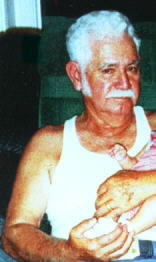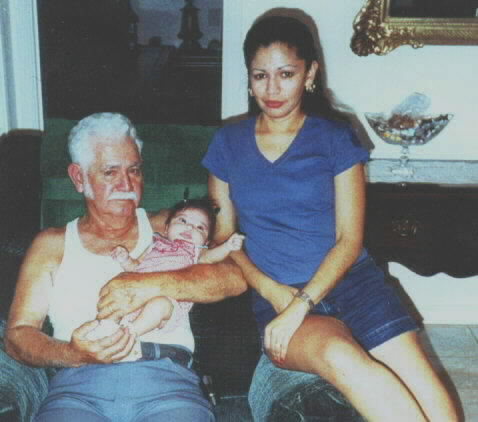Margarito C. Salazar





What type of transportation did your family have?
We owned a 1929 Chevy Flat
bed. This was used only by my dad because if it broke down, then there
was no money to fix it.
What type of chores did you have to do as a kid?
I had to feed the
animals, bail hay, plow the feilds with a mule, and help out with the farm.
Since there was only one store and not allot of money we grew our own crops and
if we needed meat we would kill a goat, pig or cow, which ever my parents
choose. Since we had no refrigerator, we would share with the other 5 families
that lived in Leon Valley at the time. We would preserve the meat by hanging it
out like jerky and when it was cooked, it would be boiled to soften it up before
preparing.
Did your family always have plenty of food?
Yes, I don't ever
remember going without food. Since we all shared, there was always plenty for
everyone. If one family was having a difficult time then everyone would all chip
in.
Where did you attend school and what was the highest level of education did
you complete?
I went to Leon Valley High School and went up to the
tenth grade. This was a school that went from kinder to 10 th grade and we
didn't have a high school in our town so if we continued, we would save to
attend Jefferson. This is no longer a school it is an administrative office now.
Then our home burned down and I had to leave school to work. My first job was at
Kelly Field, but as everyone knows that if you worked there all you learn to do
is drink with the boys. I didn't help out much because most of my money went on
beer. That didn't sit well with my parents so I didnt work there too
long.
What did you do for fun as a kid?
I rode the horses, played ball,
and played with old tires rolling them to each of my brothers. We worked allot
so there was not alot of time to play but we would find time to do things and
fish in Leon Creek with our home made poles. When we played base ball, we used a
sugar cane stick as a bat and that worked just fine. We didnt have everything
that kids have now a days but we always had something to do.
Did you join the Army to help your family out with money?
No, I was
drafted on February 18, 1946, then 2 days later they released me but I was
offered $100 to re-enlist. I was given no reason for this but $100 was allot of
money in those days and it could help out my family. My brother later told me
that it might have been because my two other brothers were also in the
service.
Where were you stationed? What was your rank? When were you
diischarged?
I was stationed in Sidney, Japan but my training was at
Fort Lorton in Kent Kalbert,New Jersey. I was a Private First Class and was
discharged August 4, 1947 after serving 18 months. In those days you didnt have
to enlist for 2 or 4 years.
How did your parent
feel about you being drafted, and were you the only member of your family to be
drafted?
My parents were o.k. with it and no I was not the only member
of my family to be drafted. I was the second to be drafted into the Army. I also
had one brother that was in the Air Force by his choice. Back in those days we
didnt have fear of war or being away from our family, it was just something that
had to be.
. Was this the first time you had ever left the state of Texas?
Yes,
I had never been out of the state until I joined the Army. Not only did I leave
the state but I left the country as well. For a small time boy, that was real
exciting for me, so I guess that is why I didn't get home sick.
Did you learn any skills while in the Army that would help you get a job when
you got out?
Yes, I learned to run phone wire and hook up new lines.
Which in those days I was called a linesman. The set back to that was that I was
not told in the Army that I couldnt use it once I got out. When I was discharged
and started looking for a job, I was told that this was a job for a white man
not a Mexican or black. There was work for me at other places but not there,
Mexicans were not welcome. In the Army we all got along and there was no
discrimination when it came to work.

